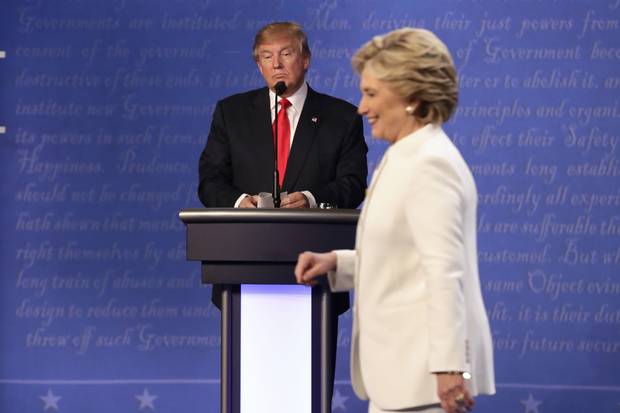
Donald Trump waits behind his podium as Hillary Clinton makes her way off the stage after the third presidential debate at UNLV in Las Vegas on Oct. 19, 2016.
DAVID GOLDMAN/ASSOCIATED PRESS
The U.S. election took one of its most disturbing turns at the third presidential debate in Las Vegas, where Republican candidate Donald Trump evaded the question of whether he'd accept the election result if he lost (which, as it turned out, he didn't). Ian Brown revisits the scene and looks back at a strange, divisive and dark campaign
What was the most alarming of all the alarming moments in the unprecedented 2016 presidential campaign? Here's a possibility: October 19, two-thirds of the way through the third presidential debate in Las Vegas, when Donald Trump, the strangest Republican presidential candidate ever, refused to say whether he would accept the result of the election if he lost.
It's one thing to suggest that someone ought to shoot your opponent, which is something else Mr. Trump did during the campaign. But that's just a criminal act. Refusing to accept the will of the majority – choosing to listen only to those who agree with you – undermines not just the law, but the very foundations of the democracy for which the United States has been justly famous, lo these past 240 years.
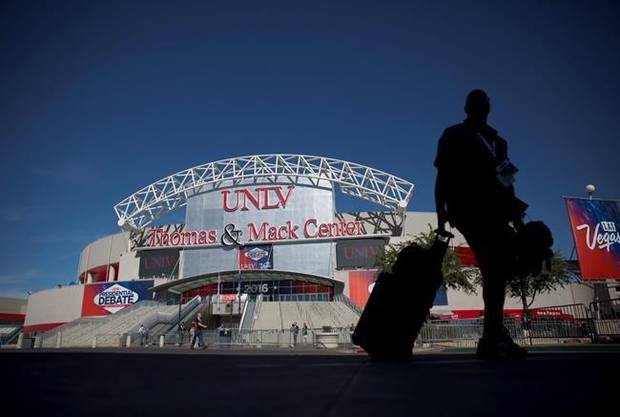
The Thomas & Mack Center.
DAVID GOLDMAN/ASSOCIATED PRESS
Elizabeth Renzetti dissects Clinton and Trump’s Las Vegas showdown
2:43
Last Saturday, I took a drive out to the Thomas & Mack Center at the University of Nevada, Las Vegas, the basketball arena where the debate was held, where the terrifying moment happened.
There was nothing to see. There was no trace of the formal, sound-proofed TV studio created for the debate out of black drapes and a stage. The 1,200 people lucky enough to have watched the spectacle live were no longer there. The thousands of reporters and anchors and producers who fed the faceoff to more than 71 million viewers had gone home.
What I could see, instead, on the last Saturday afternoon before election day, was the UNLV men's basketball team, practising.
It's a mid-rank team, but the players looked smooth and graceful whirling through their drills. All I could hear in the giant cave of the arena was the squeak of sneakers and the slap of the ball and the occasional shout, sounds made by people who knew what they are doing. Looking down at them was like looking into the works of a beautifully made, perfectly ticking watch. Which is definitely not the experience anyone has had watching the furious presidential campaign, trying to foresee the bitter future and endless disputes it may portend. That felt more like an endless screaming match between two entirely separate crowds, each locked away in an arena of its own, chanting a language only it understands.
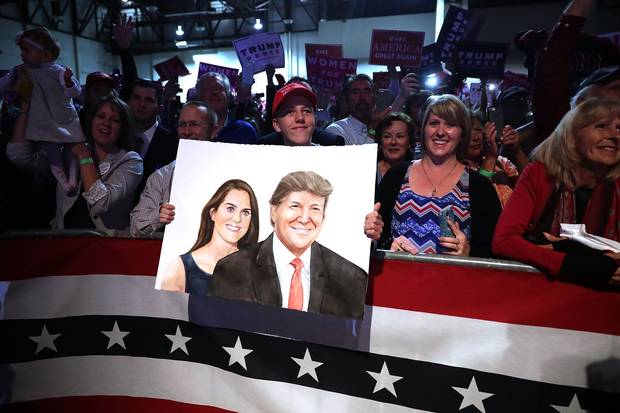
A Trump supporter holds a painting of the Republican candidate and his wife, Melania, at a campaign rally the Reno-Sparks Convention Center in Reno, Nevada, on Nov. 5, 2016. Nevada is a crucial swing state for both candidates.
CHIP SOMODEVILLA/GETTY IMAGES
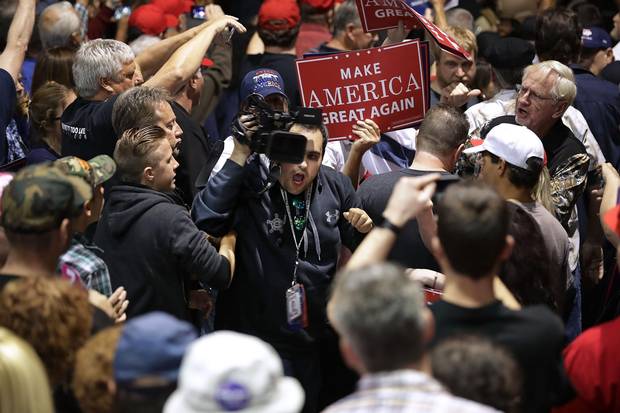
CNN’s Noah Gray is shoved and shouted at by Trump supporters as he trys to cover breaking news at the Reno rally. Mr. Trump got hustled off-stage during a disturbance at the rally; someone in the crowd shouted “Gun!” during scuffles with a man who was holding up a “Republicans against Trump” sign.
CHIP SOMODEVILLA/GETTY IMAGES
Hillary Clinton had her share of gaffes – the "basket of deplorables" comment; the fainting; the thousands of leaked e-mails from the hacked account of her campaign chairman, John Podesta, revealing the embarrassing private workings and cynicism of her campaign team. But it was "Donald," as Ms. Clinton unerringly referred to him during the debates, evoking both the duck and a pouting five-year-old, who provided the bulk of the horror.
The sheer number of unprecedented developments in the campaign was itself unprecedented.
Where should we start? With his long-standing birtherism, and his mid-September concession that Barack Obama was, in fact, born in the United States? His suggestion that Mexican immigrants are drug dealers and rapists? His complaint that an American-born judge couldn't be impartial because of his south-of-the-border heritage? His proposed ban on Muslim immigrants, also designed to appeal directly to the so-called "white nationalists" in his base? His refusal to show his tax returns and the bombshell that he hadn't paid any in 20 years anyway? His shameless display of this fact as proof of his skill as a businessman? The astonishing fact that, as of Oct. 9, three dozen Republican leaders had disavowed his leadership? The equally astonishing list of Republican leaders who have not? That was all brand new.
Perhaps, in the contest to determine his most outrageous action, you prefer to go with his denigrating and demeaning of women, topped off by the 2005 tape, revealed in early October, in which he admits to the thrill of sexually assaulting women by grabbing their crotches. At least 18 women have come forward with corroborating testimony, but Mr. Trump has dismissed them as liars and/or not good-looking enough to be molested. Is this sounding like any presidential campaign you have witnessed before?
He refused to disavow the support of racists and anti-Semites associated with the Ku Klux Klan and the Breitbart News Network, the vividly conservative propagoctopus formerly run by his current campaign chairman, Steve Bannon. (At one point in the campaign, a third of the sources that Mr. Trump retweeted – he has more than 11 million Twitter followers – were linked to one or more of 50 popular white nationalist accounts.) He mocked a disabled journalist (for being disabled, no less) and denigrated Khizr and Ghazala Khan, Muslims whose war hero son, U.S. Army Captain Humayun Khan, died serving his country in Iraq in 2004. He told Senator John McCain, a prisoner of war in North Vietnam, that he, Donald, preferred his war heroes uncaught. Any one of these hoo-haws would have finished off any other presidential candidate. Not Titanium Trump.
But the bad boy was just warming up. In addition to suggesting his Second Amendment-supporting, gun-toting supporters shoot her, he threatened, if elected, to throw Ms. Clinton in jail. (And if not elected, he'll try anyway.) Thousands of his supporters cheered him on. He openly disagreed with his running mate, Mike Pence, on the establishment of a no-fly zone in Syria – i.e., important stuff. None of that has happened before in a presidential campaign.
All politicians, Ms. Clinton included, obscure the truth. But Mr. Trump took lying to unscaled postmodern heights, reinvented the act itself. "There's a modern perception of politicians as dishonest," says Jacob Thompson, an associate professor of communications studies at UNLV. "But in terms of Trump, it seems he's taken that relationship with the truth to a whole new level." When he announced his intention to guarantee women six weeks of maternity leave – one of the rare moments in the campaign devoted to policy rather than bickering – Mr. Trump claimed Ms. Clinton had no similar program. In fact she had announced her own plan, for 12 weeks of leave, a year earlier. Everyone knew this, but that did not matter to Donald Trump. Most politicians try, at least some of the time, to use facts as bricks in a debatable wall of policy. Mr. Trump hurls them as weapons, half a brick at a time. This is not new to presidential politics. But his shamelessness was.
An institute called PolitiFact found 70 per cent of his statements to be false. He claims there are between 30 and 34 million illegal immigrants in the United States today; the real number is 11 million. He claimed the unemployment rate was 42 per cent; it was actually 4.9 per cent. He insists he saw "thousands and thousands" of people celebrating on 9/11; no one else has. He declares a crisis of Mexicans flooding into the United States; in fact, the rate at which people are trying to cross the border into the United States from Mexico is at its lowest ebb in 40 years.
But it was his refusal to commit to accepting the results of the election during the third debate that seemed to create the biggest shock wave. "I will look at it at the time," he said in reply to moderator Chris Wallace's question.
"Are you saying you're not prepared now to commit to that principle?" Mr. Wallace asked, pressing his luck.
"What I'm saying," Mr. Trump said, impatiently, "is that I will tell you at the time. I'll keep you in suspense."
From the archives: Trump is noncommittal about respecting election result, calls the election rigged
1:28
That's a lifelong Trump trick: destabilizing the conversation while he reasserts his advantage. But democracy isn't a contract you rewrite with each new deal: it's a delicate truce, based on the willingness of the participants to eat crow when they lose, and accept the will of the majority. At its best, it requires a faith in temperate, tolerant, rational, bipartisan disagreement. Mr. Trump has thrown out this rule by embracing the unfounded and the irrational.
He began to seriously question the legitimacy of the democratic process – it's rigged! – in October after the grab-them-by-the-pussy tape dealt his campaign an almost lethal blow. "Millions … are registered to vote that shouldn't be registered to vote," he told the world during the third debate. This is glaringly, shockingly, almost pornographically untrue: There is almost zero evidence of that kind of voter fraud in the United States at the federal level.
But that doesn't matter; the damage is done. Never mind that 81 per cent of Mr. Trump's supporters think the election could be "stolen." According to a recent New York Times poll, 40 per cent of all likely voters said Mr. Trump's behaviour made them less likely to vote. The more toxic his complaints, the more people wanted to take a lye shower and hide under the covers for the duration of the election. (Who could blame them?) That was his strategy: The lower the turnout, the greater Mr. Trump's chance of martialling his rabid base to victory. This is tactics, not principle, the ends triumphing heedless over the battered means. If a nihilist is someone who pursues power at any cost, Donald Trump, presidential candidate, is a nihilist through and through. Now the Republican party bears the same shameful reputation.
These tactics have been been shockingly effective, nonetheless. At the beginning of August, polls suggested Mr. Trump was eight points behind Ms. Clinton, especially in the critical states of Florida and Ohio. Two weeks later, Mr. Trump replaced his campaign manager with Mr. Bannon, the former Goldman Sachs executive who took over Breitbart News, the right-wing news service and fever machine with 31 million visitors a month and close ties to the white nationalist base. (Mr. Bannon believes the current Republican party, never mind the centrist one of Nixonian yore, is nowhere near conservative enough.) By September 22, Mr. Trump was leading in both states. Last week, right after FBI director James Comey announced he was reopening the Clinton e-mail investigation, an ABC-Washington Post tracking poll showed Mr. Trump leading Ms. Clinton by a single percentage point.
Why? Was it Mr. Comey's doing? Is it because Hillary's a girl? Or is it because one side of the U.S. political spectrum isn't even talking to the other side any more, corralled as each is in its own separate and non-intersecting informational silo? One side reads The New York Times and listens to NPR, the other to Sean Hannity while scrolling through WND, "the world's largest Christian website" (current headline: "Why Hillary is too evil for voters to comprehend"). Mr. Trump team's most radical move has been to replace facts with innuendo, abandoning all ethical proprieties in the process. It no longer matters that the net worth of the average white household in the United States is 14 times that of an average black household. If you can make non-Hispanic whites fear the fact that they are becoming a minority in a modern, interracializing world, you can bring them to heel.
And this is amazing, too: the fact that widely informed people understand these manipulations has less and less impact! UNLV's Robert Lang, a professor of public policy and director of the Brookings Mountain West institute, points out that the exceptionality of the 2016 presidential campaign has been glaring at everyone since the primaries. There hasn't, he notes, been a candidate for president as inexperienced as Mr.Trump since Wendell Willkie, the Republican nominee in 1940. Prof. Lang's colleague Prof. Thompson adds that Mr. Trump is further distinguished in that he is the only candidate since George Wallace – and Mr. Wallace was an independent in 1968 – to have openly "made remarks about white ethnic nationalism. He is specifically going after a white nationalist vote."
Prof. Lang never worried about what a President Trump might do to the United States. "I don't think he's going to suspend the constitution, because he'd be impeached from within his own party. So the U.S. is going to continue whatever this is, if he's elected. But there are countries" – notably those in the shadow of Russia that were rattled by Mr. Trump's talk of dismantling NATO – "that might not. You can't run foreign affairs like a New York protection racket."
It's the even bigger picture that worries Prof. Thompson. "To me," he says, "one of the most disturbing things about this election is the declining faith in American institutions." According to recent surveys, a quarter of 18- to 25-year-olds – that would be the generation of Americans after the millennials – don't believe in democracy.
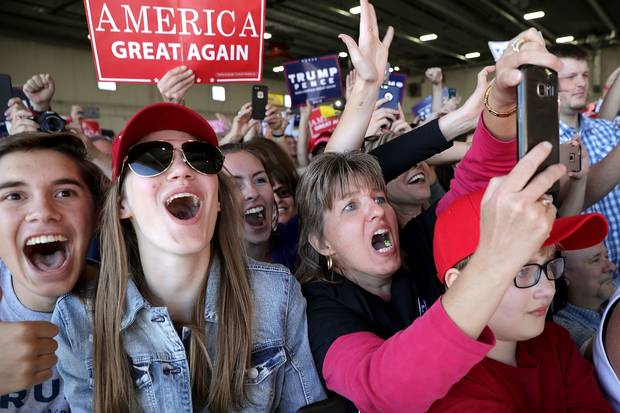
Supporters cheer for Donald Trump during a campaign rally in the Sun Country Airlines Hangar at Minneapolis-Saint Paul International Airport on Nov. 6, 2016.
CHIP SOMODEVILLA/GETTY IMAGES
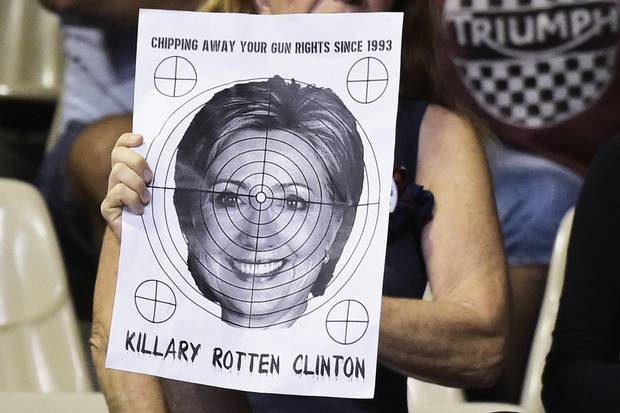
A supporter holds a target with Hillary Clinton’s face on it at a Trump rally in Sarasota, Fla., on Nov. 7.
MANDEL NGAN/AFP/GETTY IMAGES
Out in Sun City Summerlin, a suburb northwest of Las Vegas for people 55 and older, the houses are all the colours pale sand can be. It's a clear, cloudless, pretty spot: instead of grass, the desert lawns are reddish gravel, which makes the cacti and the green succulents stand out as much as the deep blue Trump signs. They outnumber Ms. Clinton's 10 to 1, though the swing-seat race between Republican Joe Heck and Democrat Catherine Cortez Masto for Democratic senate leader Harry Reid's vacated Nevada spot is too tight to call. At least $1-million worth of anti-Masto attack ads began to air recently, paid for by a political action committee reportedly endowed in part by Charles and David Koch, backroom patrons of libertarian and Tea Party candidates across the land.
This is the kind of community in which all the campaign fodder has landed, where all the bitterness has pooled, where one can finally meet the voters Mr. Trump intended to ignore or not, regardless of the outcome of the vote.
Catherine Parker, a 78-year-old former government worker, has just raised her American flag. "That's for Hillary," she says. "That goes up every morning. I've resorted to my flag and prayer, these last few days." She voted the Democrat ticket the first day early voting was allowed. Her neighbour across the street has never voted before – he didn't think it was important – but this time he has a Trump sign. Catherine thinks a Republican woman down the street converted him. Catherine can't understand why anyone's voting for Mr. Trump. "We're lowered our standards here of what we do in America. He's vulgar, he's not very bright. And I've yet to hear him explain any of the points he'd like to make. He just says he's going to do something." She figures a lot of her Trump-side neighbours are reading all the stuff coming out of hard-right websites such as Breitbart. The whole neighbourhood seems to be incessantly online. "They have trouble with this mixed racial culture," she says. "I think they're afraid."
That's the difference, of course, between voting for someone you admire, and voting against something you despise: When you do the latter, all the hope you have for a beautiful world is reduced to a fear that it will be snatched away. That's why the 2016 presidential election campaign has been so riveting, and so exhausting. Down the hill from Catherine's, Gerald Rittmiller – robust, 79, with a full shock of platinum hair – is walking up his driveway. He's just had both knees replaced, and can't stand for long yet, but he has a new pickup and a golf cart, a lovely house, a neat garden.
"I'm just not a fan of all the stuff the Democrats have done," he says. He was an instrument technician in an oil refinery before he retired. "I don't like Obama. I never did. I didn't vote for him. We've got a lot of Muslims in the country now. Obama's a Muslim, whether he admits it or not." He worries the Muslims will get together and vote in sharia law. Gerald's neighbour, however, has a Hillary sign on his lawn. "We're friends. I just say, 'We're not gonna talk about politics.' He thinks Obama's great. And I think he's a Muslim faggot."
Oh, I say. What's your evidence for that?
"It's all there on the Bathhouse Barry website." Bathhouse Barry is a Facebook page that, when it isn't deriding Democrats and linking to other websites that do the same, claims (with no evidence) that Barack Obama is a long-time homosexual.
A slight look of discomfort passes over Gerald's face. "So much of this stuff comes in via e-mail," he says, shaking his head. "How much can you believe?" It's an excellent question. These days, none of us is sure we know the answer.
U.S. ELECTION 2016: MORE FROM THE GLOBE AND MAIL
Mini-doc: Exploring Trump’s appeal in the Pennsylvania heartland
6:15



